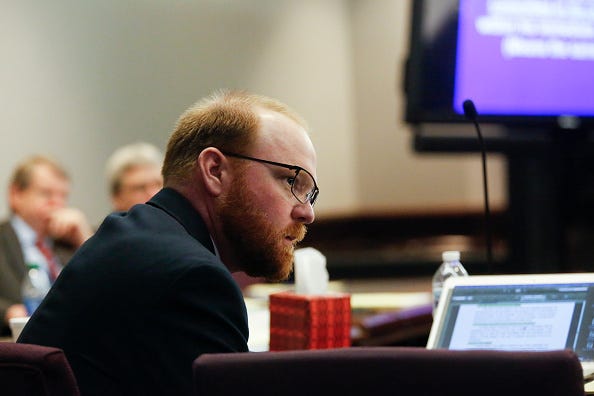
PHILADELPHIA (Audacy) — In the trial of the three men accused of killing Ahmaud Arbery, a 25-year-old Black man from Georgia, in 2020, the jury found the defendants guilty, after just two days of deliberations.
The men charged, Gregory McMichael, Travis McMichael, and William "Roddie" Bryan Jr., were charged with nine total charges, including malice and felony murder.
Travis McMichael was found guilty on all charges. Gregory McMichael was found guilty on eight of the nine charges. Bryan Jr. was found guilty on six of the nine charges.
The prosecution argued that the three men chased and killed Arbery while he was jogging in Georgia.
The defense had claimed that Arbery was to blame for his own death, saying that he was "running away instead of facing consequences" and "making terrible, unexpected, illogical choices."
Meanwhile, prosecutors say that the three men acted as dangerous vigilantes, claiming that their motives were racially motivated.
The decision comes as Kyle Rittenhouse was acquitted for shooting three men, injuring one, and killing two in another case where self-defense was claimed and accusers believed the situation was racially motivated.
Similarly, the prosecution in the Rittenhouse case also claimed he acted as a vigilante, and therefore could not claim self-defense. But he did, and in that case, he won.
However, the key difference between the two cases is that Arbery was unarmed and ran from the trio while the men Rittenhouse injured and killed were armed.
On the stand, defendant Travis McMichael claimed that he was in a "life or death situation" when he shot Arbery. But, he later admitted that Arbery was unarmed and never threatened him.
Linda Dunikoski, the lead prosecutor and fourth to take over the case, added in her closing rebuttal that Arbery was accused of no crime, and the defendants told police they knew of no crime he'd committed when they shot him to death. "No weapons, no threat, no way to call for help, he didn't even have a cell phone on him. He ran away for five minutes," the prosecutor said in closing arguments.
The jury consisted of nine white women, two white men, and one Black man, according to CNN.
Opening arguments started on Nov. 5, and all three men had pleaded not guilty to the charges. The trial concluded earlier this week.
Arbery's death sparked national outrage after a video of his killing surfaced online, months after it had happened. Around the same time, George Floyd was murdered at the hands of Minneapolis police.

"Justice was served today!"
The above words of NAACP Philadelphia Branch President Catherine Hicks evoked the feelings of many about the verdict that came Wednesday.
However, like many, she tempered her joy with her beliefs about the current state of the criminal justice system in America.
"As we prepare to move into the Thanksgiving holiday season and yes, we are thankful for this verdict, let us be reminded that although justice was served in the Ahmaud Arbery trial, a life is still lost and countless other lives have and continue to be lost, because our justice system is still flawed!" she exclaimed.
"As a black person in America, it has been proven we do not have the same liberties as our white counterparts. Our boys can’t wear hoodies, we aren’t safe in the comforts of our own home, and we can’t take a jog in the neighborhood because someone could become fearful of their life."
Read her full statement below.



